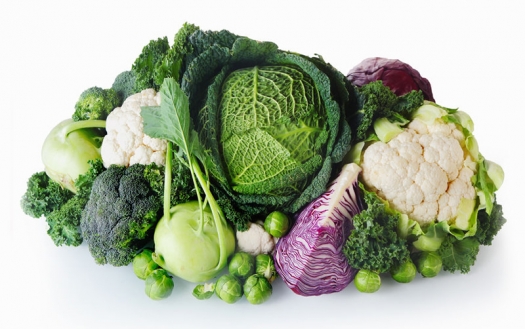For years, you’ve probably heard about one food after another that can prevent or treat cancer. But do foods really have the ability to fight cancer? After all, we’ve all heard stories of people with cancer who radically changed their diet, but still died from the disease. It’s good to have a healthy skepticism when it comes to any “miracle cure” for cancer. But foods aren’t miracles. They are fuel for your body. So it’s time for a new look at foods and how to use them to prevent and treat cancer.
Researchers are always looking for new ways to use food to help us avoid cancer or fight it if it does sneak past our defenses. Their discoveries can shape how we use foods to keep our bodies healthy and restore it to health.
Much of the chemopreventive research has centered on cruciferous vegetables. These include leafy greens, such as kale and arugula, Bok choi, broccoli, Brussels sprouts, cabbage, and cauliflower. If you find these foods bitter, that’s nothing compared to how cancer cells perceive them. These foods contain anti-cancer agents that include indole-3-carbinol (I3C), sulforaphane, apigenin, and benzyl isothiocyanate (BITC). Many studies have linked eating cruciferous vegetables with lower rates of colon, prostate, lung, and breast cancers, and research on these newly discovered anti-cancer compounds may help explain why these foods are so effective.
Part of the reason cancer can be so difficult to fight is that the cells multiply so quickly. It’s hard to keep up and wipe them out effectively. However, in order to spread like this, the cells need sufficient blood supply. This is where apigenin (commonly found in celery, parsley, cilantro, and chamomile) comes in. Studies of human ovarian cancer cells have found that apigenin helps keep these blood vessel lifelines from growing. It does so by blocking the production of two necessary signaling molecules in the vessel-growth process. These ovarian cancer cell studies also found that apigenin helped prevent the proliferation of the cells and blocked the formation of a protein the cells needed to metastasize.
And that’s not all apigenin can do. You may know that cancer cells thrive on glucose, one of many reasons to follow a low-sugar diet. Apigenin may be able to support your efforts to starve cancer cells of their energy supply. In human pancreatic cells, apigenin has been shown to down-regulate the proteins that feed glucose to the cancer cells. The cancer cells essentially starve to death without their glucose deliveries. Not only that, the apigenin blocks pancreatic cancer cells’ proliferation attempts by modulating the signaling
molecules that tell the cells to multiply. This keeps early cancer cells from becoming a tumor.
We talk a lot about reducing inflammation in the body, and that’s in part because inflammation can trigger the growth of cancer cells and can cause tumors to continue to spread. Research has found that apigenin can help with this too, as studies have found that it helps defend pancreatic cells from the attacks of the inflammatory cytokine NF-kappaB. Apigenin also helps reduce the inflammation associated with lupus and other autoimmune diseases.
Apigenin inhibits the cyclo-oxygenase (COX) enzyme as well. This is a highly pro-inflammatory enzyme. Another bioflavonoid that has this effect is quercetin. Foods high in quercetin include dark cherries, tart cherries, tomatoes, berries (blueberries, blackberries, and bilberries), cruciferouss veggies (Brussel sprouts, cabbage, and broccoli) leafy green vegetables (spinach, kale, and collards), and citrus fruits.
In 2009, researchers at Harvard’s Channing Laboratory in Boston investigated the protective effects of five common dietary flavonoids. Of these, only apigenin demonstrated a significant reduction in cancer risk. While you can find apigenin in a variety of fruits and vegetables, it’s particularly prevalent in parsley, celery, and celeriac as well as chamomile tea. These foods make great additions to an anti-cancer diet.
Cruciferous vegetables should also be at the top of your grocery list to ensure you get adequate amounts of Benzyl-iothiocyanate (BITC). Eating this component of cruciferous veggies correlated with a reduced risk of lung, breast, ovarian, and colon cancers. In breast cancer cells, BITC blocks their ability to use energy properly, causing apoptosis (cell death) before tumors can form. In ovarian cancer cells, BITC goes a different route, imitating a signaling molecule that tells the cells to shut down. BITC can also disrupt the cell cycle that leads to reproduction in breast cancer cells without harming normal cells nearby. Preliminary research suggests BITC may be able to do the same to pancreatic cancer cells as well, which is quite promising. This would potentially make it much safer than chemotherapy, which kills cells more indiscriminately. BITC also can help make cells more sensitive to radiation and increase their production of reactive oxygen species, leading to their self-inflicted deaths.
We regularly encounter carcinogens in our diets and our environments. While we may do our best to avoid them, some exposure is inevitable. You may wonder why we don’t all have some form of cancer considering the number of risks we take every day. Part of the reason is that enzymes in our bodies have to “activate” these carcinogens before they can increase our cancer risk. BITC can help keep these enzymes from acting on these carcinogens. However, BITC works best when you have some of this nutrient in your system before or when you encounter a carcinogen, so you need to be sure you’re consuming BITC-rich foods regularly.
BITC isn’t the only compound that can help block these enzymes. Indole-3-carbinol (I3C) does this as well, while also helps us detox from the carcinogens themselves. Moreover, our stomachs convert I3C into a compound called diindolylmethane (DIM), which helps us produce immune regulatory molecules. Like apigenin, DIM can also help block the development of the blood vessels that feed cancer cells, cutting off their fuel supply. DIM also increases apoptosis rates in prostate and breast cancer cells.
When you eat cruciferous vegetables, you’re not just getting apigenin, BITC, and I3C. You’re also getting sulforaphane, a by-product of the digestion process that helps both prevent and fight cancer by helping us detox, contributing to apoptosis, interfering with the cancer cell reproduction cycle, and fighting metastasis. In fact, it may be one of the best nutrients we have for defending ourselves from the damage UV rays can cause.
One study conducted in China investigated residents of the Qidong province. Liver cancer rates are excessively high in this area because many residents consume foods that have been contaminated by a fungal carcinogen called aflatoxin. When the study participants drank a tea made from broccoli sprouts, those who had the highest levels of sulforaphane in their urine had fewer urinary markers for DNA damage caused by aflatoxin. The participants also experienced a significant drop in levels of another carcinogen, this one caused by burning fuel. While most of us probably don’t want to drink broccoli sprout tea regularly, this study is a good reminder to make broccoli and broccoli sprouts a regular part of our diet.
Researchers at South Dakota State University would agree. They recently found that a compound and enzyme in cruciferous vegetables can help keep some cancers from recurring and spreading. When you chew these vegetables, this compound and enzyme mix together to produce a substance called phenethyl isothiocyanate (PEITC), which can kill cancer stem cells.
You may have heard of stem cells before. They’re usually a good thing because our bodies can use them to form any type of cell we need. This makes them incredibly valuable both for our health and for research purposes. Cancer stem cells are just as important to cancers. And they’re hard to wipe out. Even when treatments, such as chemotherapy or radiation, destroy tumors, the stem cells often survive, making recurrence of the cancer a possibility. They can also travel through our blood vessels, causing cancer to spread. And because they’re incredibly small and treatment-resistant, they can be nearly impossible to wipe out.
PEITC can help. When researchers combined PEITC with human cervical cancer stem cells in a Petri dish, after 24 hours approximately 75% of the stem cells were dead. In another study with mouse lung tissue, exposure to PEITC significantly reduced the spread of cancer. While these studies are still just the beginning of this line of research, the results are promising, particularly because you can obtain the amounts of PEITC used in the studies through diet alone. The researchers particularly recommend eating raw watercress and cabbage regularly to get high levels of PEITC. In a study, non-smokers who ate only three or more servings of these vegetables a month had a 73% lower risk of developing bladder cancer compared with smokers who did not eat these vegetables. Interestingly, the benefits of the cruciferous vegetables only last in the body for 12 hours. This would mean that the participants only received 36 hours of nutritional benefit out of the 720 hours in the month.
Of course, cruciferous vegetables aren’t the only source of anti-cancer compounds. You also can try seaweed and medicinal mushrooms such as Maitake, Reishi and Cordyceps, all of which contain, believe it or not, a sugar or polysaccharide. This sugar is beta glucan, which can improve the body’s production and function of B-cells, T-cells and Natural Killer cells. We often tell cancer patients to avoid sugar because cancer cells use it as food, but this form is different. This sugar, beta glucan, may help fight melanoma and breast and stomach cancers. It’s particularly exciting because it may even help people who have developed a resistance to existing cancer drugs.
I know eating seaweed may not sound appealing if it’s not something you’re used to. Fortunately, there’s are great supplements. One is an extract from an edible seaweed called ecklonia cava. This seaweed is incredibly rich in antioxidants that are both fat- and water-soluble, helping them reach and protect every cell in your body. A remarkable benefit of supplementing with ecklonia cava is that it has been shown to reduce BMI, body fat ratio, waist circumference.
Avoiding cancer is a complex undertaking, and what works for some people won’t work for everyone. Part of this is due to variations in our genes. Our genes influence our susceptibility to diseases such as cancer and our prognosis if we do experience them. When our genes become unstable, whether due to telomere damage or damage from outside sources, we can become more susceptible to mutations and other dangers.
Researchers continue to seek out more targeted treatments that can both destroy cancer cells more effectively and protect patients’ healthy cells. Much of the research in this area focuses around avoiding genomic instability.
A recent report in Seminars in Cancer Biology highlighted the work that researchers are doing in this area. In particular, researchers are focusing on preventing DNA damage in the first place and improving DNA repair. They’re investigating the roles of a number of nutrients in this process, including vitamins D and B, selenium, carotenoids, and resveratrol.
When we talk about eating a healthy diet, it’s easy to think of doing so only as it relates to achieving or maintaining a healthy weight. But while that is important, the foods we eat can clearly do so much more, from helping repair DNA damage to actually killing off cancer stem cells. This is why it’s so important to consume a wide variety of fruits and vegetables regularly. You’ll get so much benefit from the nutrients they contain, whether it’s BITC and PEITC or compounds whose effects haven’t even been discovered yet. Since so much is known about the power of cruciferous vegetables, I encourage you to start there. Have at least one serving every day.
Originally published in Women's Health Letter, December 1, 2016. Used with permission.



